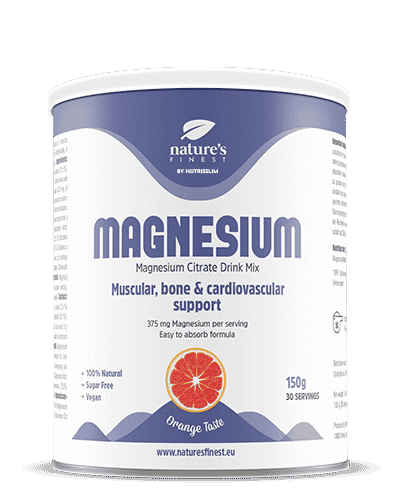Why is magnesium so important for our health?
Magnesium is the fourth most abundant element in our body.
It plays an important role in regulating blood pressure, blood glucose, in regulating insulin and in the metabolism of adenosine triphosphate (energy molecules). It is involved in more than 300 enzymatic reactions that are responsible for our body to function normally, it is also involved in protein synthesis and the transmission of nerve stimuli. It affects normal psychological functioning, heart function and bone health.
The recommended daily intake of magnesium is more than 300 mg, depending on the sex, age and other characteristics of the individual. Magnesium is found in the body mostly in the bones, but it is also found in muscles and other soft tissues, and the least of it is in extracellular fluids – in the blood.
Good sources of magnesium are nuts, whole grains, legumes, green vegetables, oranges, bananas. Magnesium deficiency is called hypomagnesaemia. Diabetics, the elderly, and people who have increased excretion (athletes) or decreased absorption (stress, intestinal diseases) of magnesium are most prone to it. The consequences of hypomagnesaemia are hypertension, metabolic syndrome, atherosclerosis, muscle spasms, arterial calcifications and others.
Recent studies show that magnesium intake is declining, which can have a serious impact on an individual’s health. Intake of extra 100 mg/day of magnesium was associated with a 5% reduction in the risk of hypertension, with an 8% reduction in the risk of stroke. The European Food Safety Authority has also approved several health claims related to magnesium.
1 Rosanoff A. in sod., 2012. Suboptimal magnesium status in the United States: are the health consequences underestimated? Nutrition Reviews 70; 153–164 2 Grober U. in sod., 2015. Magnesium in prevention and therapy. Nutrients 23; 7:9, 8199-8226 3 NIJZ, 2016. Referenčne vrednosti za energijski vnos ter vnos hranil. 4 Han in sod., 2017. Dose-response relationship between dietary magnesium intake, serum magnesium concentratio and risk od hypertension: a systematic review and meta-analysis of prospective cohort studies. Nutritional Journal 16; 16:26 5 DiNicolantonio J.J. in sod., 2018. Subclinical magnesium deficiency: a principal driver of cardiovascular disease and a public health crisis 5:1 6 Larsson C.S., 2012. Dietary magnesium intake and risk of stroke: a meta-analysis of prospective studies. The American Journal of Clinical Nutrition, 95:2, 362-366 7 Nacionalni portal o hrani in prehrani, www.prehrana.si/sestavine-zivil/minerali/magnezij

Magnesium
Magnesium: Highest quality, best absorption. Supports muscle, psychological functions.
£9.70 £8.23
